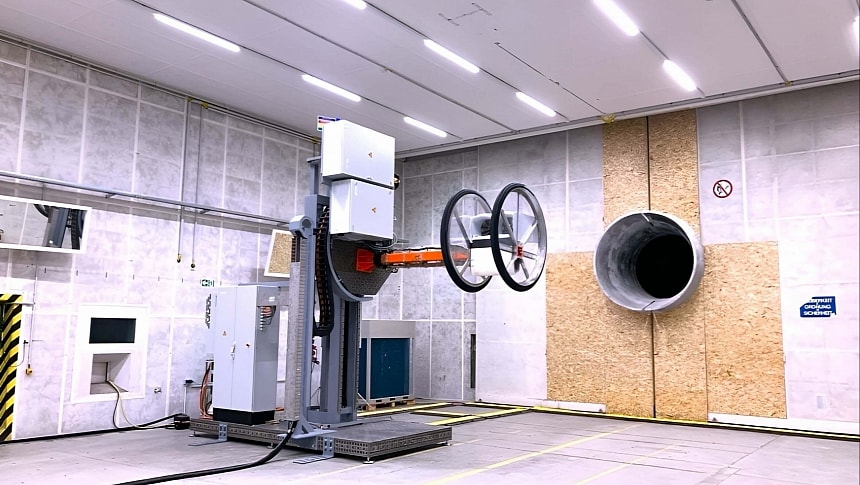It's been almost ten years since Lilium's co-founders embarked on the bold and risky adventure of adapting jet technology to an all-electric propulsion system for a revolutionary eVTOL jet. The most recent milestone is the first major confirmation that it was all worth it: the company's electric jet propulsion unit passed its first series of tests with flying colors.
In the emerging sector of eVTOLs (electric vertical takeoff and landing), Lilium stands out as a pioneer of electric jet propulsion technology. This month, the propulsion unit for the future Lilium jet, comprised of two engines and a propulsion mounting system, was successfully tested for the first time.
The tests were carried out at a dedicated test bed, part of the Lilium headquarters near Munich, Germany. The next steps are ground testing and then integrating the unit into the first flight aircraft. The units that will be used in these upcoming tests are set to be rolled off the assembly line in just a few months.
There's a lot of work that goes on behind the scenes in preparation for series production. The German eVTOL company has joined forces with numerous suppliers from all over the world to make this happen. The Spanish technology group Sener recently delivered the first set of servo-actuators, an essential component for transition flight. Another Spain-based company, Aernnova, built the propulsion mounting system. SKF was selected to supply the electric motor bearings, Aeronamic for the compressor fan, and Denso and Honeywell for the e-motor.
Lilium's battery cell supplier is InoBat, which will produce battery cells for the electric jet at two facilities in Voderady, Slovakia. Volta 1 is already operational, and Volta 2 is coming up. This second facility will become InoBat's first gigafactory, aiming for a production capacity of four gigawatt-hours (GWh).
InoBat is linked to Gotion, which holds a 25% stake in the Slovakia-based company, while Volkswagen Group is Gotion High-Tech's largest external shareholder. This is important because Gotion, which supplies the unified cell that will be used for 80% of all Volkswagen Group's electric vehicles in the future, will directly support InoBat with know-how and resources for the upcoming gigafactory Volta 2.
Lilium hopes to kick off piloted flight tests in the second half of this year. The German eVTOL jet is expected to obtain certification two years from now (it was one of the first to go for dual EASA and FAA certification).
In the meantime, Lilium continues to grow its customer base worldwide. The innovative eVTOL jet is also due to kick off air taxi operations in Florida and California after UrbanLink Air Mobility made a firm commitment to purchase 20 units from the German producer. The future electric jet will be available in various configurations, including a luxurious four-seat version with a premium cabin interior.
The tests were carried out at a dedicated test bed, part of the Lilium headquarters near Munich, Germany. The next steps are ground testing and then integrating the unit into the first flight aircraft. The units that will be used in these upcoming tests are set to be rolled off the assembly line in just a few months.
There's a lot of work that goes on behind the scenes in preparation for series production. The German eVTOL company has joined forces with numerous suppliers from all over the world to make this happen. The Spanish technology group Sener recently delivered the first set of servo-actuators, an essential component for transition flight. Another Spain-based company, Aernnova, built the propulsion mounting system. SKF was selected to supply the electric motor bearings, Aeronamic for the compressor fan, and Denso and Honeywell for the e-motor.
Lilium's battery cell supplier is InoBat, which will produce battery cells for the electric jet at two facilities in Voderady, Slovakia. Volta 1 is already operational, and Volta 2 is coming up. This second facility will become InoBat's first gigafactory, aiming for a production capacity of four gigawatt-hours (GWh).
InoBat is linked to Gotion, which holds a 25% stake in the Slovakia-based company, while Volkswagen Group is Gotion High-Tech's largest external shareholder. This is important because Gotion, which supplies the unified cell that will be used for 80% of all Volkswagen Group's electric vehicles in the future, will directly support InoBat with know-how and resources for the upcoming gigafactory Volta 2.
Lilium hopes to kick off piloted flight tests in the second half of this year. The German eVTOL jet is expected to obtain certification two years from now (it was one of the first to go for dual EASA and FAA certification).
In the meantime, Lilium continues to grow its customer base worldwide. The innovative eVTOL jet is also due to kick off air taxi operations in Florida and California after UrbanLink Air Mobility made a firm commitment to purchase 20 units from the German producer. The future electric jet will be available in various configurations, including a luxurious four-seat version with a premium cabin interior.








